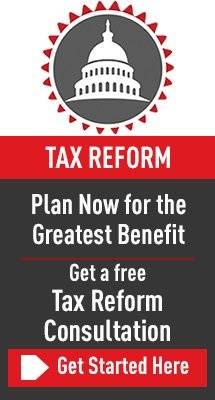 The largest tax change in a generation was made almost two years ago, but it’s still big news for small businesses. In fact, final regulations are still being written. As we prepare to head into fall, this is a good time to think strategically about your tax situation.
The largest tax change in a generation was made almost two years ago, but it’s still big news for small businesses. In fact, final regulations are still being written. As we prepare to head into fall, this is a good time to think strategically about your tax situation.
This article will highlight a couple of key business tax changes for McDonald’s franchisees, specifically depreciation changes and something new called the qualified business income deduction.
Tax Reform Depreciation Changes Affecting McDonald’s Owner/Operators
 With tax reform came a number of enhancements in the area of depreciation. What is depreciation? To a car or boat owner, it may sound like a bad word … but for business owners, it’s not!
With tax reform came a number of enhancements in the area of depreciation. What is depreciation? To a car or boat owner, it may sound like a bad word … but for business owners, it’s not!
When you buy something, it has value, and generally speaking, it doesn’t need to be replaced every year, so you get to deduct – or write off or depreciate – a portion of that asset over time. There are two major methods of accelerating depreciation – or accelerating that write-off – through Section 179 and Bonus Depreciation. These are extremely important, especially when you’re counting on those reinvestments to reduce your tax bill.
READ MORE: Tax Reform Mostly Increases Depreciation Opportunities for McDonald’s Franchisees
Section 179 Depreciation Changes
Section 179 expensing is the choice to immediately expense an asset rather than depreciate it. The tax law doubled the maximum amount you can take in Section 179 to $1 million, with certain limitations.
The act also expanded what’s eligible for Section 179; not only does it include new and used equipment, but also includes qualified improvement property, or QIP (more details on that later). It also includes certain investments to the building, like roofs, HVAC units, fire protection systems and alarm systems.
Let’s say you build a new restaurant in 2018 that cost $2.4 million; you could potentially write off $1 million for a whopping tax savings of $296,000.
Bonus Depreciation Changes
Tax reform brought about enhancements in the area of bonus depreciation. You can now depreciate 100% of qualifying property in the year of purchase, and now it includes both new and used qualifying assets.
This deduction may sound similar to Section 179, but the main difference is bonus is taken on a class-by-class basis; whereas 179 is asset-by-asset.
Careful planning with your CPA will help ensure the best outcome. 100% Bonus Depreciation is available through the end of 2022, and then the bonus allowance goes down each year until it is phased out completely after Dec. 31, 2026.
You should think about depreciation strategically. Just because you can take all those deductions in one year doesn’t mean you should. You may want to think about how depreciation impacts your tax situation over time to ensure the best way to reduce your overall tax burden.
Why drive income down to zero in one year and potentially pay tax at the highest tax brackets in the next year?
READ MORE: Tax Reform & McDonald’s Franchisees: The Benefits
Qualified Improvement Property
In Congress’ efforts to simplify the code, they went a little too far and “accidentally” eliminated the 15-year improvement category. Now, all leasehold improvements to a restaurant building revert back to a 39-year life, as it was prior to September 2001.
As of today – barring passage of any technical corrections – QIP is still considered 39-year property. The National Owners Association’s government relations team along with the AIPCA are working to encourage a remedy. NOA recently advised its franchisee members to contact their congressmen and other Washington contacts to advocate for a change. Your call could make a difference!
If you have done a rebuild, relocation or new store build; the best strategy is to contact Kevil & Kevil for a cost segregation study to maximize your tax benefits under the law as it stands today.
Qualified Business Income Deduction for McDonald’s Owner/Operators
The biggest tax benefit for McDonald’s franchisees is the qualified business income (QBI) deduction.
The Qualified Business Income Deduction allows a taxpayer to generally not pay income tax on 20% of their business income for tax years 2018 through 2025. No limit exists for this deduction, but restrictions and certain requirements kick in as a taxpayer’s income rises.
This provision benefits owners of sole proprietorships and pass-through entities, which is how most of your organizations are structured.
It shelters 20% of qualified business income, which is income that is usually taxed at ordinary income tax rates. The higher your qualified business income, the larger your potential deduction.
This impact is tremendous. Think about this – a taxpayer in the highest income tax bracket with $1 million of business income could reduce their tax bill by $75,000 with this new tax deduction.
There are phase-ins, limitations, and thresholds, so talk to your CPA to best understand how this law applies to your situation.
Start Working on Tax Strategy Now
If you didn’t plan for taxes this year, you need to work with a CPA that can and will help you not just for this year but by looking forward proactively at the next several years. Contact us for tax planning assistance.





